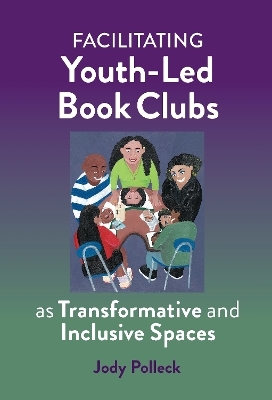
Facilitating Youth-Led Book Clubs as Transformative and Inclusive Spaces
Teachers' College Press (Verlag)
978-0-8077-6750-4 (ISBN)
Learn how to integrate book clubs into secondary school communities for transformation and inclusion so as to enhance and nurture students’ literacies along with their social and emotional development. Using her extensive experiences with culturally, neurologically, and linguistically diverse students, the author provides a rich resource that demonstrates how book clubs serve as critical places where adolescents can develop as readers while simultaneously working to build authentic relationships with their peers. Polleck offers research and theories grounded in culturally sustaining pedagogies and healing-centered engagements along with practical strategies for book club facilitators—from developing specific student-centered pedagogical approaches to embodying critical and humanizing dispositions.
Book Features:
Guidance based on the author’s 25 years of experience as a facilitator and researcher of book clubs.
A focus on encouraging meaningful participation, identity and community building, and social justice.
An approach that prioritizes collaboration among teachers, social workers, counselors, administrators, parents, and other school personnel.
Practical strategies that include facilitation suggestions, sample lesson plans, and reflective questioning techniques.
Engaging narratives that center the voices of students who have participated in book clubs.
An accompanying website with suggested reading lists, teaching materials, classroom activities, and more.
Jody Polleck is an associate professor and the program coordinator for literacy education at Hunter College, City University of New York. She also continues to work in NYC schools as both a literacy coach and teacher.
Contents
Acknowledgments xi
1. Transformation and Inclusivity: The Foundation for Student-Centered Book Clubs 1
What Has Been My Journey to Book Clubs? 3
What Are Book Clubs? 5
What Does It Mean to Be Transformative and Inclusive? 7
Why Do We Need Book Clubs? 8
What Are the Benefits of Book Clubs? 9
Who Are Book Clubs For? 10
What Are the Theories That Ground Book Clubs? 12
What’s Coming Up? 15
2. Getting Book Clubs Started Within Our School Communities 18
Who Can Start and Facilitate Book Clubs? 19
What Is the Purpose of Your Book Clubs and Who Will Participate? 21
Where and When Do We Meet? 21
Which Books Do We Use and How Do We Get Them? 23
How Can We Be More Intentional About the Books We Read? 28
How Do We Get Students to Join Book Clubs? 30
How Do We Build Community to Prepare Students for Classroom-Based Book Clubs? 30
How Do We Build Literacy Skills to Prepare Students for Classroom-Based Book Clubs? 31
3. Creating Student-Centered, Inclusive Spaces Through Culturally Sustaining and Emotionally Responsive Facilitative Practices 36
What Does It Mean to Be a Culturally Sustaining and Emotionally Responsive Facilitator? 38
What Happens During Our First Book Club Session? 45
4. Maintaining, Sustaining, and Assessing Book Club Conversations 55
What Are the Structures We Can Use to Maintain Book Clubs? 57
What Are the Rituals We Can Use to Sustain Our Book Clubs? 66
What Mini-Lessons Can We Use to Sustain Our Book Clubs? 68
How Can We Nurture Students’ Reading Outside of Book Club? 72
What Assessments Can We Use to Maintain and Sustain Student Progress? 74
5. Developing Literacies and Spaces for Emotional and Identity-Based Engagements 81
What Do We Mean By Literacy Development? 82
What Does It Mean to Engage in Emotional and Identity-Based Work? 86
How Can We Address Trauma Within Our Book Clubs? 93
How Do We Simultaneously Address Reading Development Along With Emotional and Identity-Based Work? 94
How Do We Integrate Writing Into Book Clubs? 101
6. Developing Students’ Social Awareness, Interpersonal Relationships, and Agency 104
How Can We Use Book Clubs to Develop Students’ Social Literacies? 106
How Can Book Clubs Center Social Awareness? 112
How Can Book Clubs Help Students Develop Relationships? 114
How Can We Use Book Clubs to Impact Students’ Sense of Agency? 121
7. Engaging With Youth Families and in Digital Spaces 129
How Can Book Clubs Be Inclusive of Our Students’ Families? 129
What Do Book Clubs Look Like in Digital Spaces? 133
Epilogue: Centering Joy in Book Club Spaces 138
References 143
Index 156
About the Author 164
| Erscheinungsdatum | 03.08.2022 |
|---|---|
| Verlagsort | New York |
| Sprache | englisch |
| Maße | 156 x 229 mm |
| Gewicht | 249 g |
| Themenwelt | Schulbuch / Wörterbuch ► Wörterbuch / Fremdsprachen |
| Geisteswissenschaften ► Sprach- / Literaturwissenschaft ► Sprachwissenschaft | |
| Sozialwissenschaften ► Pädagogik ► Schulpädagogik / Grundschule | |
| Sozialwissenschaften ► Pädagogik ► Schulpädagogik / Sekundarstufe I+II | |
| ISBN-10 | 0-8077-6750-6 / 0807767506 |
| ISBN-13 | 978-0-8077-6750-4 / 9780807767504 |
| Zustand | Neuware |
| Haben Sie eine Frage zum Produkt? |
aus dem Bereich


